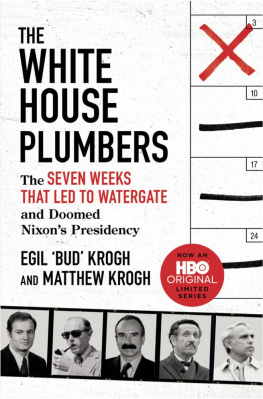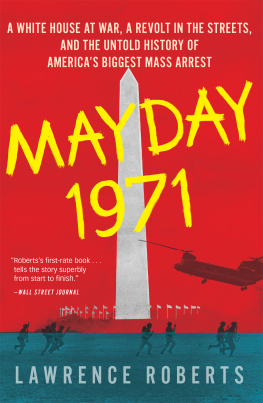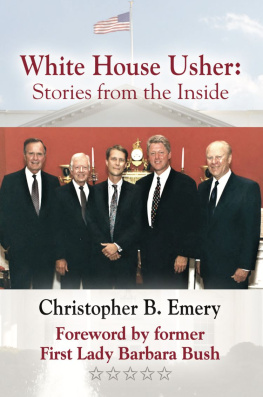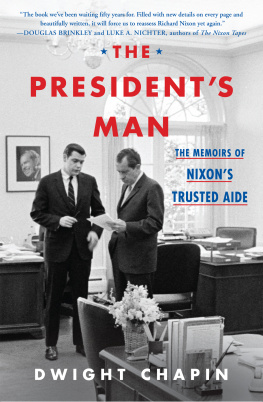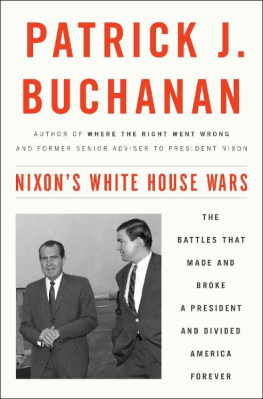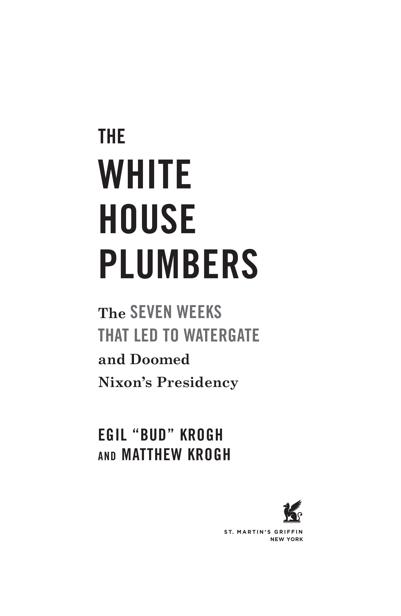
The author and publisher have provided this e-book to you for your personal use only. You may not make this e-book publicly available in any way. Copyright infringement is against the law. If you believe the copy of this e-book you are reading infringes on the authors copyright, please notify the publisher at: us.macmillanusa.com/piracy.
To Egil Bud Krogh, whose greatest wish was for each of us to have the integrity to make the next right choice
(August 3, 1939January 18, 2020)
In my dining room at home in Bellingham, Washington, I still have the brown leather recliner that Dad bought so he could be more comfortable while we worked on this book together. Its faded from the sun and slightly crackly, much like the older recliner my brother Peter still has, one that Dad brought back to Washington State from our time in Washington, D.C. Dad passed in January 2020, and atonement for his impact on America, on the executive branch, on the rest of us, was a core theme of his life since getting out of prison in 1974.
Dad was an animated and compelling storyteller, and a person who thought deeply about his moral compass and the implications of choices he had made. In 2006, when we started this book in earnest after successfully finding a publisher with our wildly talented agent (and, full disclosure, Buds stepdaughter and my stepsister Laura Dail), the theme was different than it is now. Then, the theme was more focused on personal atonement.
But as the book took shape, the key question of why one might end up searching for atonement became the focus. The answer: a loss of integrity. In a 1974 article in Redbook by my mom, Suzanne, she recounts our familys experiences during the Watergate period and her frequently confirmed first impression of Dad as a highly intelligent man with a wry sense of humor and, most important, as a man of integrity. Dad had all kinds of metaphors for integritythe hull of a boat, the shell of an egg, others more far-flung. But he spent years, decades, trying to understand why his own integrity was breached and eventually understood the long and painful process required to patch the hull of a boat that feels like it may never float again.
From meeting President Nixon in the Oval Office to his reinstatement to the bar ten years later, when he regained the privilege of practicing law after the most public of all scandals, Dad lived a journey that would be unlikely for anybody. But the lessons of what happened, how someone so driven by their own sense of right could go so wrong, feel universal. For Dad, both bookends were beginnings: The first beginning, the first bookend, was his meeting with Nixon to begin public life, a time when he took his own integrity for granted. After ten years, and the second bookend, he had a new beginning when he knew he could never again take his own integrity for granted.
Much of this book was written in a small office in my garage, as we talked through which aspects of his story made the most sense to include and, especially, which components contributed most to the core lesson about protecting ones own personal integrity from sometimes overwhelming forces. After Dads passing, as HBO considered the possibility of basing a production on this work, Laura and I did more research into historical details to add. Some of the expanded story comes from Dads perspective, using contemporaneous quotes and notes from our conversations; other details are mined from memories of family members.
I dont think as a child I had any real understanding of the magnitude of Watergate, or of Dads role and his public exposure. Even during the writing of the book, as we researched details to make sure we got them right, as we discussed what happened with Daniel Ellsberg, I still didnt quite feel the importance. But as we did additional research in recent years, letters to the editor during Dads various reinstatement hearings surfaced. The passion that people expressed in print in the late 1970smuch negative, a lot positivemake some of todays internet comments sections look tame by comparison. Those letters really shaped my sense of the personal impact that Dad and the Watergate scandals had on so many people at the time.
What you are about to read is a compact story, almost exclusively told through one mans lens. Within every chapter, if youre looking, youll find familiar stories and plot twists that you see in other, parallel narratives. The larger stories of Daniel Ellsberg and the Pentagon Papers, Watergate, the CIA, U.S.-Cuban relations, the towering personality of Nixonthese are sprawling and immense. But Iwe, including Dadhope that this one focused perspective can shed some light on decision-making gone awry under high pressure and in secret, as well as explain one facet of the scandals that brought down the Nixon presidency.
Matthew Krogh, 2022
I first met President Richard Nixon in February 1971 in the Oval Office, when John Ehrlichman brought me in to meet my new boss. I last saw Nixon in 1976 in San Clemente more than six years later, after a series of scandals gripped the nation; after he won a wildly successful presidential reelection; after his subsequent resignation from the office of the presidency; and after a deep shift in Americans faith in the executive branch of the U.S. government.
I have held myself to blame, in part, for creating the conditions for the downfall of Nixons presidency. There were other players to be sure, many motivated by upright ideals, others less so, who were prosecuted and convicted for interrelated parts of the package of scandals that came to be known as Watergate. It remains the case, however, that during seven weeks of secret work in 1971, my group and I undermined the foundations of Nixons presidency. We went too far in our pursuit of what we believed to be critically important breaches of national security. And in time, we would pay.
At that time in 1971, David Young and I were codirecting the Plumbers, a secret White House group more formally known as the Special Investigations Unit, or SIU. The president had tasked us with stopping leaks of top secret information related to the Vietnam War, the Strategic Arms Limitation Talks (SALT I), and other sensitive foreign policy operations. We believed then that these leaks constituted a national security crisis and needed to be plugged at all costs. But we were wrong, and the price paid by the country was too high.
For years I pondered the reasons I committed a serious crime as codirector of the Plumbers. Our seven-week investigation targeted what we believed to be a serious national security threatDr. Daniel Ellsbergs leak of the top secret Pentagon Papers to The New York Timesand culminated in the break-in of the office of his psychiatrist, Dr. Lewis Fielding. This crime and several others that followed, including the Watergate break-in and the illegal efforts to cover it up, eventually doomed the Nixon presidency. The break-in and burglary of Dr. Fieldings office was the seminal event in the chain of events that led to Nixons resignation on August 8, 1974.
Those seven weeks during the summer of 1971 that doomed the Nixon presidency were not the only cause of that political tragedy. However, the burglary set a precedent that two members of the Plumbers could rely on when planning and executing the Watergate break-in in 1972. They knew that under certain circumstances, the White House staff would tolerate an illegal act to obtain information. Later, during the intensive Watergate investigations, one of the major reasons for the cover-up by President Nixon and former members of his staff was to prevent investigators from discovering information about the 1971 crime.
Next page
